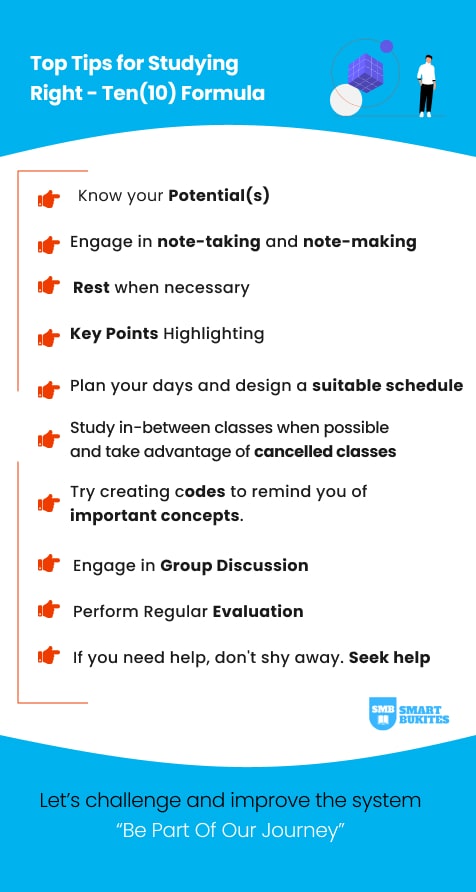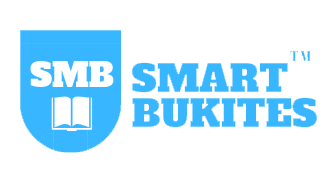
The best students study smarter, not just harder…
Wondering how to ace your exams without going through too much stress?
This post gives you a breakdown of how to study the right way for excellent performance in exams. There’s no universal studying formula, though; but strategies for maximizing your potential and performance exist!
To start with, let’s take a look at what potential really is, and its relationship with academic excellence. The term “potential” has been in existence for long, taken to mean the quality of being potent and having the ability to achieve. A person with potential is endowed with adequate energy for getting desired results. When you know or discover what you’re capable of, it’d be easier to excel, right?
The path to excelling in academics starts from knowing your potential. Armed with this knowledge, youd be able to choose the most suitable course to pursue. In addition, youd know how, when and for how long you need to study. Knowing that you’ll certainly be on your way to being the best you can be!
You can achieve this by following the crucial steps below:
1. Discover Yourself (Your Potential)
Naturally, you’re the best person to know who you are and what you can achieve. However, you can also ask for advice from parents and even counsellors.
Ask yourself: “What are my Interests and Inclinations?”
Also try to ascertain your strengths and weaknesses by evaluating your performance.
Don’t be of those who follow the crowd, friends, roommates and end up as quacks or drop-outs. Try to discover and be yourself. Remember, what works for you might not work for others. In addition, you should narrow down your choices or prospects to the most sensible one(s). Walk with great friends who are better than you and this will help you grow
2. Develop a Blueprint
After choosing a path and deciding to pursue it, you have to design and execute a suitable blueprint. Such a blueprint contains how you intend to meet your desired goal(s). For a student, excelling in academics is one such goal and guess what? Yours is a blueprint for studying right by maximizing your potentials.
But how do you do that?
For a complete study Blueprint, you have to take note of the following:
3. Identify Your Study Personality
What defines your personality in the academic arena? In other words, what kind of learner are you? Discovering the answer to these questions goes a long way in knowing the right blueprint to execute. You have to know your tendencies and abilities, as well as how your brain is wired.
The structure of our brains goes a long way in determining how we function. As agreed by experts, even the question of which side of our brains is dominant is worthy of attention. Individuals whose left side of the brain is dominant tend to be more inclined towards the sciences, logic and mathematics. On the other hand, those with the right side as the dominant hemisphere are more into intuition, arts and creativity. Therefore, to know which field you’ll most likely excel at and how to go about your study routine, observe your personality and ask yourself if you’re left-brained or right-brained. By careful observation and experimentation, you’ll be able to discover your niche and adapt appropriately.
For example, left-brained personalities usually have some interesting characteristics. These include Tidiness, Goal-setting, Rational Thinking, Determination and Direction. Suitable Study Tips for them include:
- Studying in quiet places
- Taking the lead, especially in study groups or tutorials
- Analytic writing
- Taking part in competitions, etc.
4. Study at the Right Time
This is a crucial matter for anyone seeking to study in the best possible manner. Are you a Night Owl or an Early Bird or perhaps something in between?
Some people are at their best in the early mornings, while others are more productive at night. Needless to say, if early bird studies at night, he or she might end up dozing off without much success. Likewise, a Night Owl would probably be distracted for the most part while studying during the day. Therefore, don’t waste your precious time studying when it doesn’t suit you. Try studying at different times and ascertain when youre at your productive best. On discovering it, try your best to stick to it.
5. How long do you need to study?
There’s also the question of the appropriate length of a study session. Here also, different people differ. Some people might not be able to focus for long periods of time; they either doze off, get distracted or lose interest. Plus, the brain also needs regular rest. Hence, the best option is to go for sessions which are neither too short nor too long, with regular breaks. If a session is too short, it might not be enough to cover the desired content. If, on the other hand, it is too long, one might end up forgetting what was studied earlier and perhaps a splitting headache.
Length of time dedicated to studying may also depend on the nature of the course(s) or workload. Technical courses consume more time than theoretical ones. In any case, try to time yourself in study sessions, noticing when your attention starts to waver. That would be a guide to knowing your standard study time. Also, give yourself breaks at considerable intervals. You can engage in a leisurely activity, take a sip of coffee or just close your eyes, reviewing what you’ve learnt.
Another important thing to note is that students should try revising after classes, not when work has piled up and the tests are near. Its advisable to have a private studying schedule. Plus, reviewing what was learnt during the day just as youre about to sleep could be a good idea. You might meet up with your notes in Dreamland, discovering new perspectives!
6. Binge Studying: Yay or Nay?
Sometimes, due to tight schedules, loads of assignments or even earning of funds, students are unable to study regularly. However, some just prefer to while away their time having fun instead of revising and researching. They then think it best to wait till a day or couple of days before the exam before they stay up all night to study. But is that really a wise choice?
Stress as a result of all-nighter sessions could be a cause for failure. In addition, there are health risks to consider. To excel in any field, one should practise proper time management. Setting targets, Scheduling assignments and projects and setting priorities also go a long way in ensuring productivity.
7. Your Study Environment
Different environments suit different individuals. While studying, some people prefer pin-drop silence, while others adapt better to areas with a bit of background noise. However, some others are more in their element in noisy environments.
Partaining optimum performance, discover your Study Space(s). For example many students attention wavers at home, perhaps due to siblings, TV, chores or just plain procrastination in familiar or informal environments. For them, its easier to focus on their work in official settings. In that case, a library or a quiet park might be better for them.
8. Choosing a Study Niche
Are you a ‘Solo’ or ‘Group person’? Introverted and reserved or extroverted and gregarious?
Knowing if you prefer the solitude of studying alone or the exchange of ideas in group discussions goes a long way in making your study sessions more productive.
Certainly, some people feel that they can study most efficiently while alone, away from distractions. Others, preferring to get feedback as they study, opt for group sessions or tutorials. In any case, its a good idea to avoid too much multi-tasking and always keep the primary objective(s) in mind.
9. Note the Study Content
While designing your blueprint for effective studying, you have to keep your workload in mind. Youll have to consider the nature of your courses, whether they’re theoretical, experimental or technical and design accordingly. Even when planning your timetable, some courses would certainly claim more time than others, especially since they could have different credit loads. All fingers are not equal, after all. Don’t underestimate any course, though.
Plus, some courses might require some memorizing. Try to understand the content first before memorizing, though. This will go a long way in keeping you in tune with your studies. Widen your horizons by researching and trying to link the concepts learned with real life applications.
10. Your Preferred Study Mode/Pattern
Different human beings learn differently. Some learn best by listening, while others get visuals best. Likewise, some learn best by teaching others, practising or discussing. To study the right way, you really have to identify the kind of learner you are and maintain the pattern that works best for you. This way, you’ll know which learning materials to use, be they videos, eBooks or audio notes.
In another light, a number of students are their most productive under pressure, in a strict routine. However, others learn best in a leisurely manner, while setting the pace. Whichever it is, try to master it well and do your best. Even when reading notes, some people can assimilate while reading in bulk, but may need constant revision. Interestingly, some others get hung up on details, making it a slow process. The latter can help their learning process by underlining interesting points for follow-up at a later time. This is to ensure that mind is kept focused.
Study Smarter, not just Harder!
Dear student, move with your level. University is steps ahead of secondary school. Also, even in the tertiary institution, it usually gets tougher as the level increases. Though the workload gets heavier and the assignments, harder, why not study smarter, not just harder?
We live in the age of social media, and many of us find it difficult to stay off surfing the net. Why not channel the energy and resources into more profitable ventures? World-class virtual libraries and audio-visual studying resources are now just clicks away. Experiment with different studying materials and choose the one(s) that work best for you. Learning platforms like Google, YouTube, Smartbukites go a long way in helping you study smartly.
However, during study sessions, try to keep away your gadgets if you don’t need them. In cases where you need to browse, try using apps that block or freeze your “chatting” applications to prevent distractions.
Top Tips for Studying Right
There’s something you should note, ‘Reading’ is not the same as “Studying”. Effective studying involves Reading, Practising, Researching, Revising and Active Engagement. There are a lot of Essential Study Skills that help in ensuring Academic Excellence.

Top Tips for Studying Right – Ten(10) Formula
- Know your Potential(s).
Identify talents, strengths and weaknesses. Also, note weak points and give them the necessary attention.
- Engage in note-taking and note-making
Research shows that writing aids retention. Study actively by connecting knowledge learned to real events. Take note of courses and consequences of occurrences as well as sources and applications of concepts.
- Rest when necessary
Don’t suffer a brain drain or become sick. Note your limits and don’t go overboard. Before tests or exams, rest and eat well. Avoid too much pressure and anxiety. Take care of your mental and physical health. Have some free time. Engage in activities that boost creativity and intelligence. These can include brain-boosting games and exercise.
- Key Points Highlighting
While reading, highlight important areas and make further research where necessary. You can write questions in the margins and look up words or concepts you don’t understand. Plus, you can even ask your mates or lecturers.
- Plan your days and design a suitable schedule
Also set and meet targets. Organization and planning help a lot in increasing productivity. Quality of studying is more important than Quantity, and the quantity can be in bits. You dont have to study for long hours at a go. You can space your study sessions and break up the content to be studied.
- Study in-between classes when possible and take advantage of cancelled classes
You can also use the time to research for assignments or projects. The keynote here. Don’t waste time!
- Try creating codes to remind you of important concepts.
Also, applying what you learn will leave long-lasting effects beyond your exam results. Review and diversify your approaches, especially in solving problems. Dont just stick to one path but try finding different strategies that work.
- Engage in Group Discussion
Discussions with fellow studious friends also help a lot, especially in the Social Sciences and when making analysis. Brainstorm in a civilized manner, learning loads from one another. You can set targets, delegate tasks and work as a team. This improves not only your understanding but your social and soft skills too, which aid you in the outside world.
- Perform Regular Evaluation
Also track your progress by testing (practising, timing and rewarding) yourself. Review soon after lectures and makeup practice questions or study guides. You can also practice sample questions from textbooks and the internet.
- If you need help, don’t shy away. Seek help
Ask your colleague, elder or lecturer where possible. Or perhaps you can get a coach to put you through. Attend and give tutorials where possible. Teaching is another learning and revising process. Plus, saying things out loud usually commits them to memory. However, use your time wisely. Don’t dwell on teaching the same topic to different people at different times without moving forward yourself.
Conclusion
At SmartBukites, we’ll be with you as we walk down the lane of progress. From the choice of course of study to tips for academic excellence, registration guidelines, reading resources, online tutorials, didactic student life accounts, relevant news, strategies for productive semesters and much more, our website has it all! Stay tuned for access to many great opportunities. You can also contribute your own quota through our platform. Stay Smart!
Check Out
Author
Fatima Garba Yusuf is a wayfarer on the path of Knowledge. Keen about Reading, Writing and Research, she aims at using the tools at her disposal to create a positive impact on humanity.

